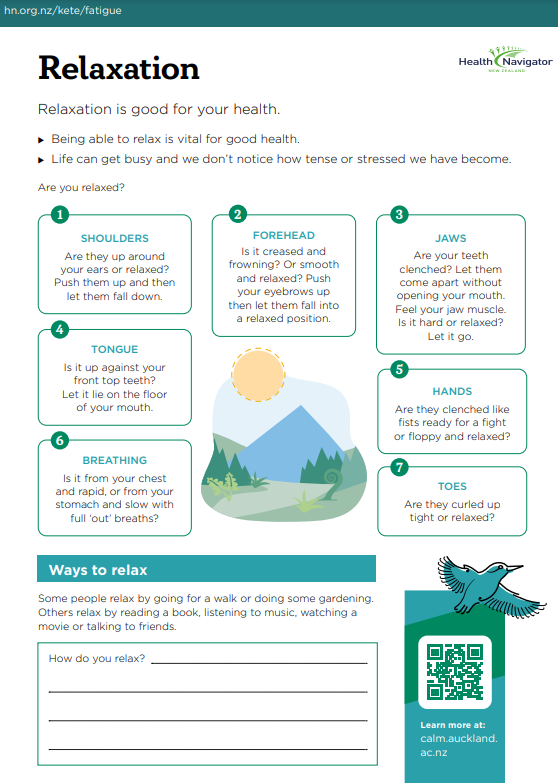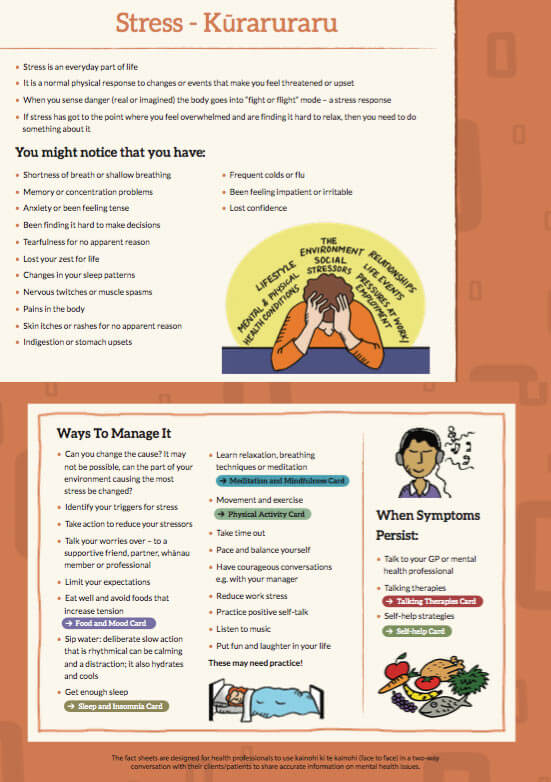If you're a frequent visitor to Healthify, why not share our site with a friend? Don't forget you can also browse Healthify without using your phone data.
Stress at work
Key points about stress at work
- Stress can be a natural reaction to any kind of excess demand or threat.
- Facing challenges at work can be positive, but too much work-related stress can affect your mental and physical health.
- Fortunately, there are things you can do to reduce your levels of stress at work.

More and more people are experiencing stress at work. It’s often related to a high workload, but it can occur for other reasons, such as:
- long hours
- the threat of job loss or redundancy
- the work tasks themselves
- workplace bullying
- not having enough social support
- harassment
- conflicts with other workers or bosses
- increasingly blurred lines between work and non-work hours.
Ongoing work-related stress may lead to mental health problems. A New Zealand study found that young people exposed to high job demands (excessive workload, extreme time pressures) had twice the risk of depression or anxiety compared to those who felt they had low job demands.
Ongoing stress may also lead to other health conditions such as chronic headaches or heart disease. This can be because of changes in your body or poor lifestyle habits used to cope with stress, such as overeating, drinking alcohol or using drugs.
Your employer has responsibilities related to your health and safety at work and may provide you with sick leave if you have work-related stress.
There are things you can do at work and at home to help you manage your work-related stress.
As well as feeling you have too much work to do, issues that can create stress at work include:
- being expected to work long hours and having to be available outside of work hours
- narrow and limited job content
- challenging work content
- too much or too little work
- lack of recognition or positive feedback
- uncertainty about what’s expected or required in your job or about the future of the organisation you work for
- harassment – bullying, violence, or discrimination based on sex, ethnicity, disability or ‘being different’
- accident hazards and dangers
- poor management styles including those that don’t include consultation with employees or value diversity in the workplace
- unresolved conflict in the workplace
- poor support for workers experiencing personal or professional difficulties.
If you’re experiencing stress at work, or in relation to your work, you may feel:
- irritable, impatient or wound up
- overwhelmed
- worried, anxious or nervous
- like your thoughts are racing and you can't switch off
- that it’s hard to concentrate or make decisions
- unable to enjoy yourself
- tense and tired
- restless or panicked.
Over time, these symptoms can affect your health, and can contribute to depression or anxiety, or physical conditions such as such as chronic headaches or heart disease.
In Aotearoa New Zealand, your employer must do everything reasonably possible to make sure that health and safety risks in the workplace are identified and managed properly. This includes workplace stress and fatigue.
Employers are required to monitor employees for potential workplace stress, such as keeping an eye on workload, job performance and the types of tasks being performed, as well as looking for any physical signs of stress. They may provide you with sick leave if your stress is work-related.
Your stress may not always be obvious to your employer, so it’s important that you talk to your manager if you’re feeling stressed at work. Often there is support available through your workplace, such as employee assistance programmes (which can include free counselling). There may be other options to help manage workplace stress such as sharing your workload with others in your team, having more time to meet deadlines or more flexible working arrangements.
If you have work-related stress, your employer may ask you to see a healthcare provider who can give you a professional diagnosis and confirm the reason for your stress, however, you don’t have to do this. You do have a duty to report any workplace threat to your health and safety, which may include stress.
At work
- Make sure you take your scheduled breaks during the day.
- Use your annual leave to take breaks – that’s what it’s there for, to give you time away from work to return refreshed and reinvigorated.
- Exercise is a great stress-buster. Any form of physical activity helps, even if you just manage to take a walk outside your workplace at lunchtime.
- Your food choices can have a huge impact on how you feel during the work day. When stressed, you can crave sugary snacks or comfort foods. But eating frequent healthy meals helps your energy levels and ability to focus.
- Avoid using substances, including smoking or vaping, or having caffeinated drinks when you're feeling stressed. This might seem calming in the moment, but they are stimulants and can lead to higher levels of anxiety.
- Reduce interruptions if you can and ‘chunk’ your time, eg, only answer emails during certain blocks of time.
- If you have too much work, talk to your manager or pass on some of of your work to workmates if you can.
- Develop good relationships with the people you work with – they can be a support to you.
- Practice being mindfulness techniques. Take a few minutes each day to focus on your breathing, allowing your thoughts and emotions to pass by without getting stuck in them. This will also help you to focus better on what you are doing. In stressful moments, take a few slow, deep breaths – this can calm down your nervous system and lower your stress in the moment.

Image credit: Canva
Out of work time
- In an increasingly digital world, it's easy to feel pressured to be available outside your regular work hours. It’s important to have clear work-life boundaries for yourself. Make sure this works for you and your workplace and if this creates stress, talk to your manager.
- Get regular exercise.
- Get enough good-quality sleep. Develop healthy sleep habits by limiting caffeine intake and minimising stimulating activities at night, such as using devices and watching television. Read more about how to sleep well or try our Twenty Winks Sleep Questionnaire.
- Talk to someone you trust about how you're feeling. Sometimes the best stress reducer is simply sharing your thoughts with someone close to you.
- Learn a mindfulness technique to help with not getting 'stuck' in thoughts and emotions.
- Have fun – don’t make work your whole life. Find out what matters to you and take time to do things you enjoy and that have meaning for you.
- Don’t use alcohol, drugs or comfort eating to reduce stress – you will only add to the problem.
- Talk to your healthcare provider or get help from a mental health professional if you continue to feel stressed even after trying these self-help tips.
Apps reviewed by Healthify
You may find it useful to look at some mental health and wellbeing apps.
WorkSafe NZ recommends the following actions for employers to reduce stress in the workplace.
- Set achievable demands for your workers in relation to agreed hours of work.
- Match workers’ skills and abilities to job demands.
- Support workers to have a level of control over their pace of work.
- Develop multi-disciplinary teams to share ideas and perspectives on ways to address situations.
- Involve workers in decisions that may impact their health and safety, and have processes to allow workers to raise issues and concerns they might have.
- Ensure managers and supervisors have the capability and knowledge to identify, understand and support workers who may be feeling stressed.
- Provide workers with access to independent counselling services.
- Have agreed-on policies and procedures to prevent or resolve unacceptable behaviour.
- Engage and consult with workers before implementing change processes, and ensure they genuinely have the ability to influence the decisions you make.
Information and resources for employers
- Working well guide and resources(external link) Mental Health Foundation, NZ Includes resources to help workplaces prioritise mental health, including Minimising and managing workplace stress(external link), Five ways to wellbeing at work(external link) and Working Well webinars on workplace wellbeing(external link)
- Open Minds(external link) Includes videos, tips and fact sheets for talking about mental health at work and a guide for managers to support someone with mental distress Mental Health Foundation of New Zealand
- Work-related health – Mental health(external link) Worksafe | Mahi Haumaru Aotearoa, NZ
- Managing mental health issues – intervening early, returning to work, progressing a career(external link) Mental Health Foundation of New Zealand
- Work-related health – health and safety at work strategy 2018–2028(external link)Ministry of Business, Innovation & Employment, NZ
- Positive communication at work factsheet(external link) Mental Health Foundation, NZ
Below are some videos from the Aotearoa New Zealand Open Minds project. See Mental Health Foundation of New Zealand Open Minds(external link) for more videos from the same series.
Video: What’s stopping us from talking about mental health at work
(Nōku te Ao, NZ, 2018)
Video: Creating culture
(Nōku te Ao, NZ, 2018)
In the videos below, managers and employees at non-office based workplaces are interviewed about their experiences of mental health at work. There are 5 videos in this series – see Mental Health Foundation of New Zealand Open Minds e-Learning(external link) for the other videos in the series.
Video: Open minds episode 1 – opening the conversation
(Mental Health Foundation, NZ, 2021)
Video: Open minds episode 2 – under pressure
(Mental Health Foundation, NZ, 2021)
Manage your stress(external link) Small Steps, NZ Whether you’re looking to maintain wellbeing, find relief or get help, Small Steps can support you and your whānau with practical tools, strategies and advice
10 stress busters(external link) NHS, UK
Brochures
Stress and how to manage it(external link) Mental Health Foundation of New Zealand, 2024
5+ a day at work – working fresh fruit and vegetables into your day(external link) The 5+ A Day Charitable Trust, NZ
Under the pump(external link) Farmstrong, NZ
Reducing the impact of stress – the three Rs(external link) Mental Health Foundation of NZ
Journey to wellbeing toolkit
Te Kete Haerenga Healthify He Puna Waiora, NZ
Apps
Mental health and wellbeing apps
References
- Wellness in the workplace survey 2017(external link) Business NZ and Southern Cross Health Society, NZ
- Stress and mental health at work(external link) Health and Safety Executive, UK
- Melchior, M. Caspi A. et al. Work stress precipitates depression and anxiety in young, working women and men(external link) Psychol Med. 2007 Aug; 37(8):1119–1129.
- How stress affects your health(external link) American Psychological Association, US, 2022
- Taking sick leave(external link) Employment New Zealand, 2024
- Managing mental health issues – intervening early, returning to work, progressing a career(external link) Mental Health Foundation of New Zealand
- Work-related stress(external link) WorkSafe, NZ, 2017
See our page on stress for healthcare providers.
Brochures

Healthify He Puna Waiora, NZ, 2022

Books on Prescription, NZ

Mental Health Foundation, NZ
Credits: Healthify editorial team. Healthify is brought to you by Health Navigator Charitable Trust.
Reviewed by: Dr Rosie Dobson, Registered Psychologist, University of Auckland
Last reviewed:





